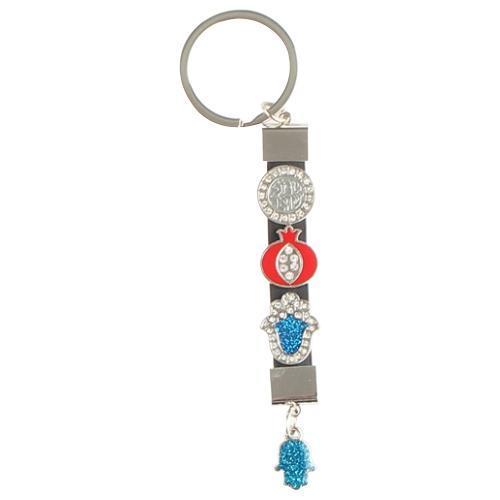
What is the source and meaning of the evil eye symbol? For those who believe and for those who just want to know.
Teilen
What is the source and meaning of the evil eye symbol?
The Evil Eye (Ayin ha-Ra in hebrew) is alleged to be able to harm or cast a curse on a person. It is discussed in the Talmud and Kabbalah. The Evil Eye is traditionally believed to be the reason for sickness, tragedy, and pain in the world. Nothing is saved from the evil influences of the eye.
The most frequent cause of harm from the Evil Eye is considered to be jealousy. Rabbis warned people against unnecessary flaunting of wealth and admiration to avoid resentment from others.
Many superstitions evolved to ward off the Evil Eye or prevent it from harming them. However, many of these superstitions were variations of non-Jewish customs.
Dating back to Talmudic times, Jews have been wearing charms around their neck to guard from the Evil Eye.

Chai
Today, some Jews often wear a Chai necklace (charm symbolizing the number eighteen) to guard themselves from harm. Furthermore great lengths are taken to hide celebrations from the Evil Eye; for instance, double weddings are never permitted for fear of uttering too many blessings and tempting the Evil Eye.
For Ashkenazic Jews, any blessing is normally lessened with the phrase “keyn ayen horeh” (without the Evil Eye) or abbreviated to “keynahora.”
Once the Evil Eye has been provoked, one must counter its harmful effects with magic. If the Evil Eye is attracted, mirrors and red or blue objects are utilized to veer away the glimpse of the eye, while a sacred verse or extreme motion .
Hamsa

The hamsa is supposed to give protection from the evil eye, bad luck that results from the attention or jealousy of others. Today it shows up in both Jewish and Muslim culture.
The eye is generally blue; a colour which is also associated with protection from the evil eye. The entire symbol is often made of or covered with a material that is somewhat reflective to reflect back the evil.

This symbol appears to have originated in the Middle East or possibly in India, where it is also found; however, it is most well-known and popular in the Middle East. 'The “Lucky W” Amulet Archive' and “the Eye in the Hand” display a number of similar symbols from throughout the world, including several pre-Columbian North American examples. A similar symbol of a blue eye in a hand also intended to protect from the evil eye, occurs in Turkish culture, but the focus is on the eye, not the hand and the Turkish blue eye also occurs on its own.

THE EVIL EYE


The evil eye is the name for a sickness transmitted -- usually without intention -- by someone who is envious, jealous, or covetous. It is also called the invidious eye and the envious eye. In Hebrew it is ayin ha'ra (the evil eye), which in Yiddish is variously spelled ayin horoh, ayin hora, or ayen hara.
In mainland Italian it is mal occhio (the bad eye) and in Spanish mal ojo or el ojo (the bad eye or just the eye). In Sicily it is jettatore (the projection [from the eye]) and in Farsi it is bla band (the eye of evil).
The evil eye belief is that a person -- otherwise not malefic in any way -- can harm you, your children, your livestock, or your fruit trees, by *looking at them* with envy and praising them. The word "evil" is unfortunate in this context because it implies that someone has "cursed" the victim, but such is not the case.
A better understanding of the term "evil eye" is gained if you know that the old British and Scottish word for it is "overlooking," which implies merely that the gaze has remained too long upon the coveted object, person, or animal. In other words, the effect of the evil eye is misfortunate, but the person who harbours jealousy and gives the evil eye is not necessarily an evil person per se.
Recommended links:
https://www.sterlingsilverjewel.com/collections/jewish-jewelry-and-gifts
https://www.youtube.com/watch?v=tkXySVpK0wE
https://www.youtube.com/watch?v=LVjOAz3Lfr0
https://www.youtube.com/watch?v=-oNRGJXBhuU

